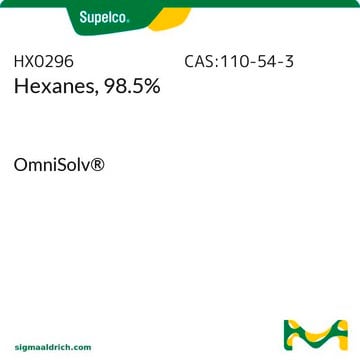DX0831
Dichloromethane
OmniSolv®
Synonym(s):
Methylene Chloride, FM approval, Methylene chloride
About This Item
Recommended Products
Agency
suitable for EPA 1613
Quality Level
vapor density
2.9 (vs air)
vapor pressure
24.45 psi ( 55 °C)
6.83 psi ( 20 °C)
product line
OmniSolv®
Assay
≥99.9% (GC)
form
liquid
autoignition temp.
1223 °F
expl. lim.
22 %
technique(s)
HPLC: suitable
LC/MS: suitable
gas chromatography (GC): suitable
impurities
≤0.005% Water (H2O)
≤0.2 μeq/g Titrable acid
≤2 ng/L Capillary ECD responsive substances (as PCNB)
≤3 μg/L Capillary FID responsive substances (as decane)
evapn. residue
≤1 ppm
color
APHA: ≤10
refractive index
n20/D 1.424 (lit.)
pH
7 (20 °C)
bp
39.8-40 °C (lit.)
mp
-95 °C
−95 °C (lit.)
density
1.325 g/mL at 25 °C (lit.)
UV cutoff
≤231 nm
UV absorption
λ: 231 nm Amax: ≤1.00
λ: 235 nm Amax: ≤0.40
λ: 240 nm Amax: ≤0.20
λ: 250 nm Amax: ≤0.01
λ: 260 nm Amax: ≤0.005
shipped in
ambient
storage temp.
room temp
SMILES string
ClCCl
InChI
1S/CH2Cl2/c2-1-3/h1H2
InChI key
YMWUJEATGCHHMB-UHFFFAOYSA-N
Looking for similar products? Visit Product Comparison Guide
General description
Application
- To prepare spectroscopic samples.
- For the dilution of s-diphenylaminostilbene which is used as a reference material for two-photon excited fluorescence (2PEF) measurement.
Preparation Note
Analysis Note
Legal Information
Signal Word
Warning
Hazard Statements
Precautionary Statements
Hazard Classifications
Carc. 2 - Eye Irrit. 2 - Skin Irrit. 2 - STOT SE 3
Target Organs
Central nervous system
Storage Class Code
6.1D - Non-combustible acute toxic Cat.3 / toxic hazardous materials or hazardous materials causing chronic effects
WGK
WGK 2
Flash Point(F)
does not flash
Flash Point(C)
does not flash
Certificates of Analysis (COA)
Search for Certificates of Analysis (COA) by entering the products Lot/Batch Number. Lot and Batch Numbers can be found on a product’s label following the words ‘Lot’ or ‘Batch’.
Already Own This Product?
Find documentation for the products that you have recently purchased in the Document Library.
Customers Also Viewed
Related Content
This page is intended to make it easier to find the consumables you need based on the analytical method you’re using. Methods included on this page come from the EPA, Standard Methods and ASTM.
This page is intended to make it easier to find the consumables you need based on the analytical method you’re using. Methods included on this page come from the EPA, Standard Methods and ASTM.
This page is intended to make it easier to find the consumables you need based on the analytical method you’re using. Methods included on this page come from the EPA, Standard Methods and ASTM.
This page is intended to make it easier to find the consumables you need based on the analytical method you’re using. Methods included on this page come from the EPA, Standard Methods and ASTM.
Our team of scientists has experience in all areas of research including Life Science, Material Science, Chemical Synthesis, Chromatography, Analytical and many others.
Contact Technical Service






